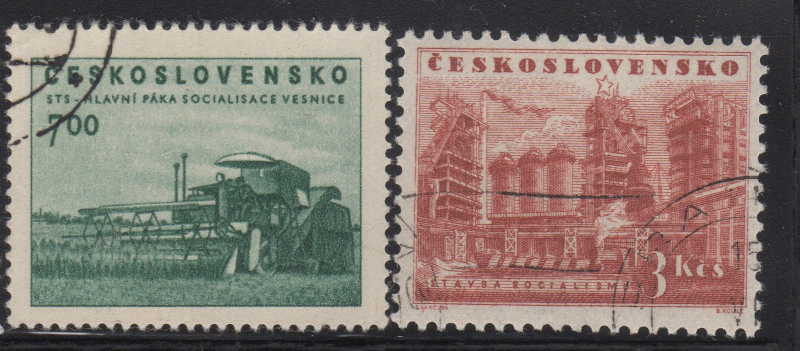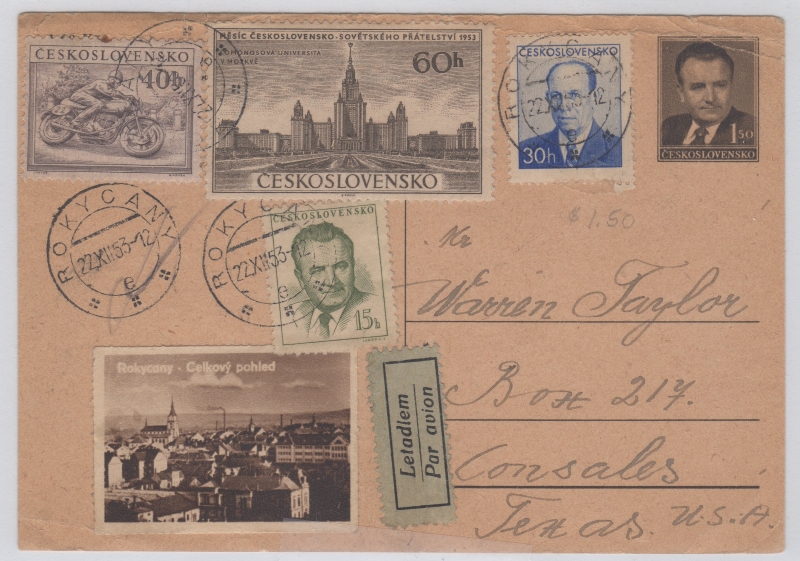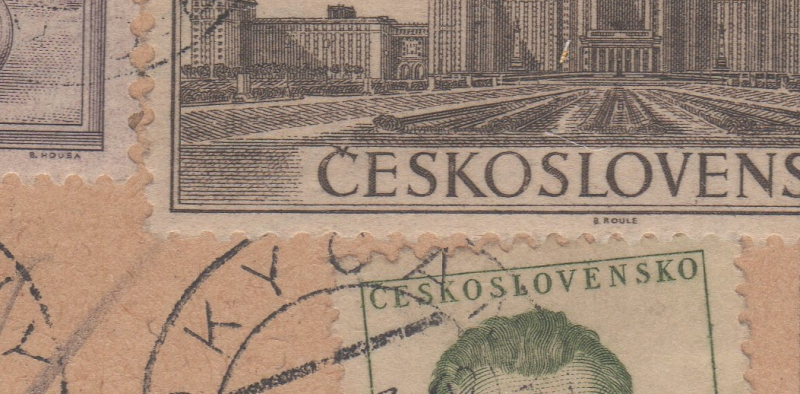On June 1st, 1953, Czechoslovakia declared a surprise drastic currency reform that devalued the current Koruna by a factor of 50:1. Known as the “Third Koruna”, this was the the 2nd reform in less than a decade, (the first being in 1945 when the 2nd Koruna was established at par value with the Bohemian/Moravian Koruna and the Slovak Koruna)
The reform was initiated as a response to the current monetary conditions that had created a fixed market run by the government and a free market in which goods were 8 times as expensive but of better quality (wikipedia).
The reform was kept secret up until it was declared June 1st catching the public (and postal clerks) off guard. New banknotes, printed in the Soviet Union were issued that day. However, the postal system was not ready and had no new stamps under the new currency until June 18th
Under the reform the public was allowed to exchange their old currency to the new currency according to the following rules:
| Per Person | Exchange Rate |
| First 1500 Kcs | 5:1 |
| > 1500 Kcs | 50:1 |
At the same time, postal rates were all adjusted at a rate of 5:1 (in reverse), or, in other words, under the new currency, the face value postage rate was 1/5th of the previous rate.

Because no new postage stamps would be issued until June 18th, the old stamps were valid for postage based on the new postage rates at an exchange rate of 50:1 (see full rate history – I think I have it correct)
| Domestic Mail | Old Rate | New Rate in New Currency | New Rate in Old Currency (50:1) through June 18th | |
| Postcard | 1.5Kcs | 30h | 15Kcs | |
| Letter (local mail) up to 20g | 2Kcs | 40h | 20Kcs | |
| Letter (non local) up to 20g | 3Kcs | 60h | 30Kcs | |
| Registered up to 20g | 5Kcs | 1Kcs | 50Kcs | |
| Express | 8Kcs | 1.6Kcs | 80Kcs | |
| Foreign Mail | ||||
| Postcard | 3Kcs | 45h | 22.5Kcs | |
| Letter up to 20g | 5Kcs | 75h | 37.5Kcs | |
| Registered up to 20g | 8Kcs | 1Kcs | 50Kcs | |
| Express | 8Kcs | 1.4Kcs | 70Kcs | |
| Airmail Surcharge (per 5g) | 4Kcs | 80h | 40Kcs |
In other words: Between June 1st and June 19th (when new stamps were issued) in order to send a local letter. You would have to affix 20Kcs of stamps to the letter. 20Kcs in the old currency was equivalent to 40h (new letter rate) in the new currency.
As you can imagine, this rate change created a lot of confusion, and, there are many interesting covers that appeared during the transition time from June 1st through June 18th.
On June 19th a new set of stamps were issued under the new currency and all prior postage stamps were declared invalid and could not be used on mail. (With the exception of Postage Due stamps which were revalued under the new currency until new ones were issued in 1954)


I became interested in this currency reform after posting a question related to a cover I have in my collection to Stamp Boards (See Post) Member Florian provided some insight into my cover and information on the currency reform that occurred in 1953.
Here is that cover:

There are a couple of interesting things about this cover:
1. It was a pre-printed cover from prior to the June 1st reform. Since this was mailed on 12/22/53, the 1.5Kcs pre-printed value of the card was invalid and so ignored. (Note that it wasn’t even cancelled with a postmark)
2. The 15h Green and 30h Blue stamps were affixed to the cover first which equaled the international postcard rate in the new currency. However, 2 additional stamps 40h and 60h) were added after the initial postmark (likely along with the Par Avion label) in order to meet (actually exceed) the airmail rate of 80h
3. Comes with a nice label featuring a view of the town (Rokycany) that this card was mailed from.

An interesting cover for my collection that revealed an interesting story about the effect of the currency reform.
Florian (on StampBoards) also linked to some really great exhibits showcasing covers from the era of June 1st through June 19th when old stamps were used at a currency exchange rate of 50:1.